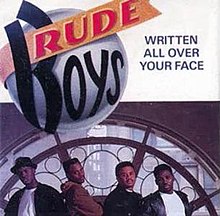
"Get Ready" is a Motown song written by Smokey Robinson, which resulted in two hit records for the label: a U.S. No. 29 version by The Temptations in 1966, and a U.S. No. 4 version by Rare Earth in 1970. It is significant for being the last song Robinson wrote and produced for the Temptations, due to a deal Berry Gordy made with Norman Whitfield, that if "Get Ready" did not meet with the expected degree of success, then Whitfield's song, "Ain't Too Proud to Beg", would get the next release, which resulted in Whitfield more or less replacing Robinson as the group's producer.

"Controversy" is a song by American musician Prince, the lead single and title track to his 1981 album. The song addresses speculation about Prince at the time such as his sexuality, gender, religion, and racial background, and how he could not understand the curiosity surrounding him.

"Didn't I (Blow Your Mind This Time)" is a song by American soul group the Delfonics, co-written by producer Thom Bell and lead singer William Hart. It was released as a single in 1969 on the Philly Groove record label and appeared on their self-titled third album the following year. The song reached number three on the Billboard R&B chart and number ten on the Billboard Hot 100 in 1970. Overseas, the song peaked at number 22 on the UK Singles Chart in and number 81 in Australia. The Delfonics won a Grammy Award for Best R&B Vocal Performance by a Duo or Group for the song in 1971.

"(If Loving You Is Wrong) I Don't Want to Be Right" is a song written by Stax Records songwriters Homer Banks, Carl Hampton, and Raymond Jackson. Originally written for The Emotions, it has been performed by many singers, most notably by Luther Ingram, whose original recording topped the R&B chart for four weeks and rose to number 3 on the Billboard Hot 100 in 1972. Billboard ranked it as the No. 16 song for 1972.

"Big Girls Don't Cry" is a song written by Bob Crewe and Bob Gaudio and originally recorded by the Four Seasons. It hit number one on the Billboard Hot 100 on November 17, 1962, and, like its predecessor "Sherry", spent five weeks in the top position but never ranked in the Billboard year-end charts of 1962 or 1963. The song also made it to number one, for three weeks, on Billboard's Rhythm and Blues survey. It was also the quartet's second single to make it to number one on the US R&B charts.

"I'll Take You There" is a song written by Al Bell, and originally performed by soul/gospel family band the Staple Singers. The Staple Singers version, produced by Bell, was released on Stax Records in February 1972, and spent a total of 15 weeks on the charts and reached #1 on the Billboard Hot 100. By December 1972, it had sold 2 million units and is ranked as the 19th biggest American hit of 1972. It remains one of the best-selling gospel songs of all time.
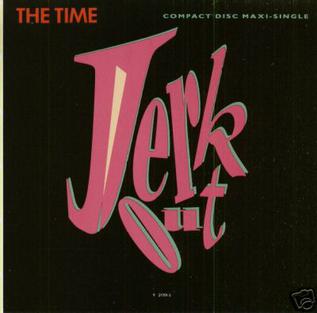
"Jerk Out" is a song from The Time's 1990 album Pandemonium. The song was originally recorded in December 1981 by Prince at his home studio during sessions for What Time Is It?. Prince originally performed all instruments and vocals and this recording remains unreleased. Prince reworked the song in the spring of 1985 for the band Mazarati. The song was ultimately left off the Mazarati album, though circulates among collectors. Again, the song was reworked in late 1989 for inclusion on Pandemonium and contains input by the band. Prince and Mazarati member Bruce DeShazer's backing vocals remain on the finished track.

"Can You Stop the Rain" is a song by American singer Peabo Bryson, taken from his fifteenth studio album of the same name (1991). It was written by John Bettis and Walter Afanasieff, while production was helmed by the latter. Released as the album's lead single, the song spent two weeks at number one on the US Hot R&B/Hip-Hop Songs chart and peaked at number fifty-two on the Billboard Hot 100. It also reached number 11 on the Adult Contemporary chart.

"How Can I Ease the Pain" is a song by American singer Lisa Fischer, from her album So Intense. It was produced by Narada Michael Walden with associate producer Louis Biancaniello. The hit song spent two weeks at number-one on the U.S. Billboard Hot R&B/Hip-Hop Songs chart. The song was sampled by rap group Three 6 Mafia for their hit "Late Nite Tip".
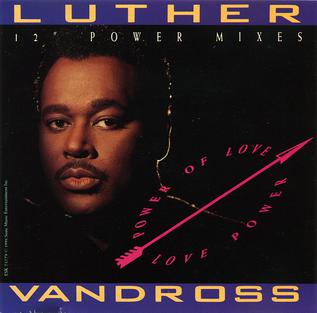
"Power of Love/Love Power" is a single by American singer-songwriter Luther Vandross. It was released on April 9, 1991 as the lead single from his 1991 album of the same name. The song spent two weeks at number one on the US R&B chart, and peaked at number four on the US pop chart, becoming his biggest pop solo hit.
"Don't Knock My Love" is a hit song performed by R&B singer Wilson Pickett and written by Pickett with Brad Shapiro. Released in the spring of 1971 from the album of the same title, it spent a week at number-one on the Billboard Best Selling Soul Singles Chart and peaked at #13 on the Billboard Hot 100 Singles Chart. The song, which was produced under a funk tempo was Pickett's last number-one single and one of his last hits for Atlantic Records.
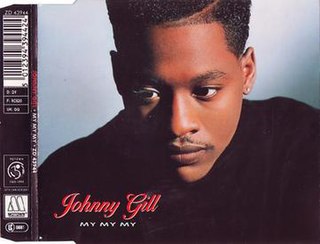
"My, My, My" is a number-one R&B single by American singer-songwriter Johnny Gill. As the second single from Gill's second self-titled album, the hit song, with backing vocals performed by After 7, as well as a jazz solo performed by saxophonist Kenny G, spent two weeks at number-one on the US R&B chart, and made the number ten on the Billboard Hot 100 charts. It was also Gill's only song to reach the Adult Contemporary singles chart, where it peaked at No. 32. In 1991 the song won a Soul Train Music Award for Best R&B/Soul Single, Male. It's also known to be Johnny Gill's signature song. This song is listed as BMI Work #1039724.

"Floy Joy" is a song written by Smokey Robinson and released as a single in December 1971 by popular Motown female singing group The Supremes.

"I'll Be Good to You" is a 1976 hit song by R&B duo the Brothers Johnson. George Johnson, one of the two Johnson brothers in the band, wrote the song after deciding to commit to a relationship with one woman, instead of dating several at a time. While George was recording a demo for the song, family friend Senora Sam came by and added some lyrics. Brothers Johnson producer and mentor Quincy Jones heard the song, liked it, and convinced George to sing lead on the finished track. Released from their debut album, Look Out for #1, it was a top-ten hit on the Billboard Hot Singles Charts, peaking at number three, and a number one song on the Billboard R&B Charts during the summer of 1976. The single was later certified gold by the RIAA.
"So Much in Love" is a song written by George Williams, Billy Jackson, and Roy Straigis. It was originally performed by Williams's American soul vocal group the Tymes and was released in the summer of 1963 on Cameo Parkway Records, which produced many pre-Beatles hits of the 60s such as The Twist. It quickly became The Tymes' first hit single, topping the US Billboard Hot 100 singles chart on August 3, 1963, and remaining there for one week, as well as peaking at No. 4 on the Hot R&B Singles chart.

"Automatically Sunshine" is a song written by Smokey Robinson and released as a single by Motown singing group The Supremes as the second single from their popular album Floy Joy in 1972.
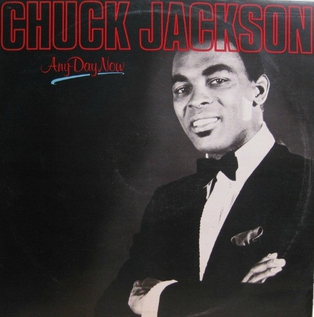
"Any Day Now" is a popular song written by Burt Bacharach and Bob Hilliard in 1962. It has been recorded by numerous artists over the years, including notable versions by Chuck Jackson in 1962, Alan Price in 1965, Elvis Presley in 1969, Scott Walker in 1973 and Ronnie Milsap in 1982. In the lyrics, the singer predicts the imminent demise of a romantic relationship and describes the sadness this will leave.
"Share Your Love with Me" is a song written by Alfred Braggs and Deadric Malone. It was originally recorded by blues singer Bobby "Blue" Bland. Over the years, the song has been covered by various artists, most notably Aretha Franklin who won a Grammy Award for her 1969 rendition. Other artists who covered the song include The Band in 1973, Kenny Rogers in 1981, and most recently, Van Morrison in 2016.

"Hi-Jack" is a 1974 r&b and funk disco based song written by Spanish musician Fernando Arbex and originally recorded by his group Barrabás for their album ¡Soltad a Barrabás!. While their version of the song was a huge success in their native Spain, going all the way to Number one over there, the song flopped in America, stalling at just number No. 104 on the Bubbling Under the Billboard Hot 100 Charts in July 1975. It was later a hit single for jazz flautist Herbie Mann.

"Your Wonderful, Sweet Sweet Love" is a song written by Smokey Robinson, recorded in October 1966 by Kim Weston. Her recording was not issued at the time as she left the label over a dispute over royalties in 1967. Weston's original version was first released in 2005.
